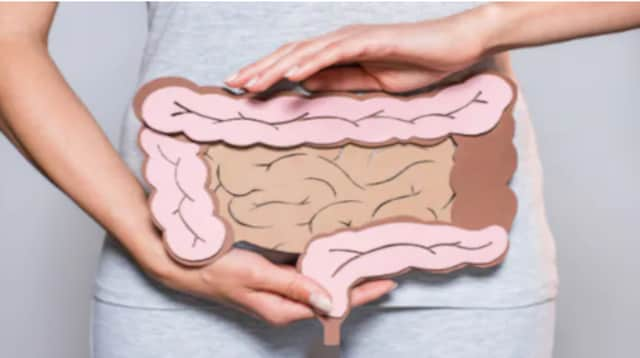Irritable bowel syndrome: Simple lifestyle and dietary modifications can be helpful

Representational image. Image source: Getty Images.
Irritable bowel syndrome (IBS) is a group of symptoms that include abdominal pain, bloating or discomfort, and changes in the frequency or consistency of bowel movements (Diarrhea or Constipation). This is a chronic disorder and causes significant morbidity and a decrease in the quality of life in affected patients. The current prevalence of IBS is around 4% in community studies, although it remains an under-reported disease.
Depending upon the predominant symptom (constipation or diarrhea), the IBS is further divided into IBS-C (Constipation), IBS-D(Diarrhea), or IBS-M(Mixed).
What are the symptoms of IBS?
As discussed above, the person with IBS has long-standing abdominal pain, bloating, cramps or discomfort, bloating, diarrhea, and/or constipation.
Generally, constipation is when the frequency of stool is less than three times a week, straining while passing motions or hard stools which are difficult to pass. The abdominal pain, discomfort, or bloating gets relieved after passing motions, but occasionally it can increase in severity. The abdominal pain may be on an intermittent or daily basis and may be mild or occasionally severe in intensity, such that the person may require hospitalization.
Due to long-standing constipation and straining, hemorrhoids (piles) can develop, causing bleeding while passing motions. Some patients also complain of mucous in the stools. There are additional non-abdominal symptoms such as decreased sleep, fatigue, headache, backache, palpitations, etc. If there are alarming symptoms such as weight loss, blood in stools or black-colored motions, fever, decreased appetite, difficulty in swallowing, etc. they need urgent attention and further evaluation as there might be a more sinister illness within.
What causes IBS?
IBS is a functional gastrointestinal disorder. The exact cause is unknown. Some theories involve Brain-Gut interactions, alterations in the GUT bacteria, or hypersensitive intestines with altered motility. A decrease in the motility of the intestine leads to an increase in the colonic transit time thus leading to constipation.
What are the factors precipitating IBS?
Sustained psychologic stress, depression, anxiety disorders, GI Infection, smoking, alcohol intake, and gluten ingestion, are some factors associated with IBS.
How is IBS diagnosed?
IBS is a functional disorder, thus there is no structural abnormality in the gastrointestinal tract. Some diseases that have similar symptoms can be mistaken for IBS are Ulcerative Colitis, Crohn’s Disease, Colon Cancer, Celiac disease, Microscopic Colitis, Chronic Pancreatitis, Intestinal Tuberculosis, etc. If any of these diseases are missed, they can have disastrous consequences. By doing appropriate tests such as Gastroscopy, Colonoscopy, and appropriate blood and stool tests, these conditions can be safely ruled out and the patient can be termed as having IBS. Hence there is no straightforward diagnosis of IBS and is a diagnosis when other similar illnesses are ruled out (diagnosis of exclusion).
What is the treatment of IBS?
The medications differ in both forms of IBS (IBS-C and IBS-D), but some general principles apply to both these types.
1. Patient Education – It is important first to educate patients that the nature of their illness is real although the tests are normal. At the same time, they need to be reassured that this is not something that leads to cancer or a bigger illness. This helps in reducing the anxiety and fear regarding their illness.
2. Diet and Lifestyle – A high-fiber diet helps in decreasing symptoms of IBS. Foods containing high fiber, or adding a small quantity of Ispaghula husk daily, helps in relieving constipation in the majority.
3. Exercise – Exercise has been shown to improve symptoms of IBS. It improves GI motility and has long-lasting positive effects.
4. Meditation – Meditation techniques help in relaxing stress and balancing thoughts, thus helping in managing the GUT-Brain aspect of IBS.
Concluding, IBS is a common but under-reported condition. It is a lifelong illness but doesn’t cause any long-term complications. At the same time similarly presenting illnesses need to be ruled out by getting appropriate tests done. Any alarming symptoms should not be ignored and one should visit the Gastroenterologist for further evaluation. Simple lifestyle and dietary modifications can be effective in the relief of the symptoms of IBS.
The author is a Consultant Gastroenterologist, Endoscopist and Hepatologist. Views are personal.
Read all the Latest News, Trending News, Cricket News, Bollywood News,
India News and Entertainment News here. Follow us on Facebook, Twitter and Instagram.
For all the latest health News Click Here

